Every exotic animal deserves the right nutrition
Crude protein not less than Sodium not more than | 16.00% 0.55% |
Dehulled Soybean Meal, Ground Aspen, Dehydrated Alfalfa Meal, Dried Beet Pulp, Cane Molasses, Oat Hulls, Soybean Oil, Sucrose, Dicalcium Phosphate, Salt, Magnesium Oxide, Choline Chloride, Calcium Carbonate, L-Ascorbyl-2-Polyphosphate (Stabilized Vitamin C), Pyridoxine Hydrochloride, Cholecalciferol (Form of Vitamin D3), Vitamin A Acetate, D-Alpha Tocopheryl Acetate (Form of Vitamin E), Folic Acid, Calcium Iodate, Menadione Sodium Bisulfite Complex (source of Vitamin K), Calcium Pantothenate, Copper Sulfate, Biotin, Vitamin B-12 Supplement, Zinc Oxide, Thiamine Mononitrate, Nicotinic Acid, Riboflavin Supplement, Cobalt Carbonate, Manganous Oxide, Ferrous Carbonate, Zinc Sulfate, Sodium Selenite.
- Feed to animals ad libitum along with appropriate browse and roughage.
- Beginning in early summer, introduce Mazuri® Moose Breeder Diet by mixing increasing amounts into the maintenance diet.
- By late summer, the breeder diet should be the only source of concentrated feed available.
- In late autumn, begin adding the maintenance diet to the animal’s breeder diet by mixing increasing amounts, until mid-winter, when the maintenance diet should be the only source of concentrate offered.
- Always provide plenty of fresh, clean water.
- Thoroughly wash feed and water bowls on a regular basis. It is always good practice to wash hands thoroughly after feeding and/or handling animals. This diet is not for human consumption.
Caution: Contains more than 15 ppm copper – If using for sheep species ensure to balance the complete diet for total copper intake.
Storage Conditions
For best results, reseal the bag between uses or store contents of open paper sack in container with sealing lid. Store in a cool (75⁰F/24⁰C or colder), dry (approximately 50% RH) location free from rodents and insects. Do not offer moldy or insect-infested feed to animals as it may result in illness, performance loss or death. Freezing will not harm the diet and may extend freshness. Use within 1 year of bag manufacturing or "Best if Used By" date.
Ask Our Experts
Get nutrition advice you can trust from experts who understand the unique nutritional needs and behaviors of your exotic animals.
Get Advice
